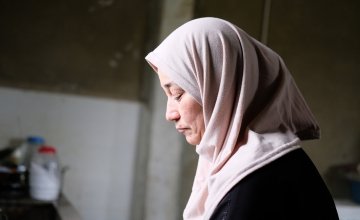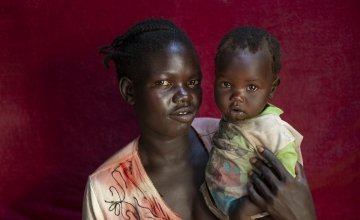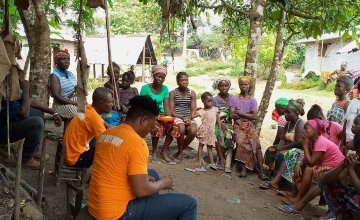
Knowledge Hub
‘The shadow pandemic’: gender based violence and Covid-19

Since the outbreak of Covid-19, emerging data and reports released by the United Nations have shown that all types of violence against women and girls, particularly domestic violence, has increased.
Coronavirus has widened global systemic inequalities affecting women and girls in a number ways, but an increase in gender-based violence – dubbed by the UN as the ‘shadow pandemic’ – is emphasising the need for prioritisation in addressing violence against women in Covid-19 response and recovery efforts.
What is gender-based violence?
Gender-based violence (GBV) refers to harmful acts directed at an individual based on their gender. It is rooted in gender inequality, the abuse of power and harmful norms. Gender-based violence is a serious violation of human rights and a life-threatening health and protection issue [UN Women].
Here are some facts:
- Globally, before the pandemic, an estimated 736 million women—almost one in three—had been subjected to physical or sexual violence, mostly by an intimate partner.
- Most violence against women is committed by current or former intimate partners.
- One hundred thirty-seven women are killed by a member of their family every day.
- Globally, violence against women disproportionately affects low- and lower-middle-income countries and regions.
- Fewer than 40 per cent of the women who experience violence seek help of any sort.
Gender-based violence and Covid-19
Numbers rising

According to a report released in 2020, 243 million women and girls aged 15-49 had been subjected to sexual and/or physical violence perpetrated by an intimate partner in the last 12 months [Covid-19 and Ending Violence against Women and Girls]. This number was predicted to rise as security, health and money worries heightened tensions and was worsened by cramped and confined living conditions.
Reported cases of GBV have increased by 30% in France, 25% in Argentina, 30% in Cyprus, and 33% in Singapore since the start of the pandemic. Increased calls to helplines or via other mechanisms for reporting GBV incidents have also been documented since the start of Covid-19 in numerous other countries, including the United States, Canada, China, Australia, the UK, Lebanon, and Malaysia.
Additional complexities
In addition to the increase in numbers, violence against women is taking on new intricacy. At a time when services to support survivors were being disrupted or made inaccessible, many women have been forced to ‘lockdown’ at home with their abusers.
- Exposure to Covid-19 is being used as a threat. Abusers are exploiting the inability of women to call for help or escape; women risk being thrown out on the street with nowhere to go.
- The stress of lockdown and its economic repercussions within households has been acknowledged as a potential trigger for GBV, as well as women asking their husbands to comply with Covid-19 prevention measures.
- Due to security concerns and containment measures that have been put in place to prevent the spread of Covid-19, there is also likely to be an increase in checkpoints and other security personnel. CARE International has stated in a recent report that this elevates the risk of abuse carried out by armed forces, police, or other relevant officials.
- The increased need for water due to recommended hygiene practices elevated violence on the way to and at water points. In addition, the long queues were met with harassment and violence by military and police officials, especially when long waiting times forced women and girls to violate curfew.
- Moreover, due to the vast economic uncertainty that has emerged as a result of the pandemic, there is also an increased risk of sexual abuse. If girls and their households are more likely to face shortages of necessary resources, they may engage in sex for survival.
- And, in some countries, resources and efforts have been diverted from violence against women response to immediate Covid-19 relief.
How Concern is helping

Concern addresses GBV and its root causes through providing:
- Resources and access to reporting facilities for survivors;
- Healthy relationship and conflict resolution education for women, couples, and families. By building capacity of couples, especially men, to be able to cope with stresses as they arise and tools to equip them to deal with them in nonviolent ways, there is the potential to reduced levels of GBV.
- Emergency relief and nutritional support. This will prevent women and girls from having to engage in risky behaviours in order to gain the support they need. It also may reduce the stress levels in the home and levels of domestic violence.
- Literacy, farming, and vocational education to build skills and opportunities for women so they can enter formal employment;
- Training for teachers on recognising and preventing abuse;
- Engagement of community leaders in reducing stigma. If community leaders see nothing wrong with GBV or domestic violence, there is a risk of women being further stigmatised. With no leadership speaking out against GBV, it further embeds the problem
- Involvement of women in community decisions. Women know what the issues are, they also know what the solutions could be or even the immediate supports needed. So, if they are involved in community decision making, they will be in a position of power to influence for change.
You can find out more about how we tackle gender inequality here.
Long term effects
While some of the immediate impacts have started to improve as restrictions have eased, many will have lifelong effects on those that have been hardest hit. The rates of depression, anxiety disorders, unplanned pregnancies, sexually transmitted infections, and HIV are higher in women who have experienced violence compared to women who have not, as well as many other health problems that can last even after the violence – and the pandemic – has ended.
Therefore, even if in the UK we appear to be slowly making moves to the road of recovery and away from the aftershocks of the pandemic, for millions of women and girls across the globe, their journey has only just begun.
Information and Support: Domestic Abuse
If you, or someone you know, have been affected by domestic abuse or violence, the following organisations may be able to help. If you are in immediate danger, you should dial 999.
The National Domestic Abuse Helpline
The 24 hour National Domestic Abuse Helpline, run by Refuge is for women experiencing domestic abuse, their family, friends and others calling on their behalf.
Phone: 0808 2000 247
The 24 hour National Domestic Abuse Helpline
The 24 Hour Domestic & Sexual Violence Helpline (Northern Ireland)
The 24 Hour Domestic & Sexual Violence Helpline (Northern Ireland) offers referral to a range of services to all women, men and children affected by domestic & sexual violence.
Phone: 0808 802 1414
Other ways to help
Donate now
Give a one-off, or a monthly, donation today.
Join an event
From mountain trekking to marathon running, join us for one of our many exciting outdoor events!
Buy a gift
With an extensive range of alternative gifts, we have something to suit everybody.
Leave a gift in your will
Leave the world a better place with a life-changing legacy.
Become a corporate supporter
We partner with a range of organisations that share our passion and the results have been fantastic.
Create your own fundraising event
Raise money for Concern by organising your own charity fundraising event.





